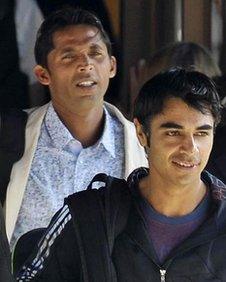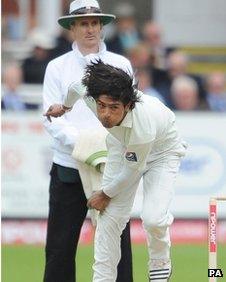'Sordid' scandal in Pakistan's beloved cricket
- Published

Asif (left) and Butt are the first cricketers to be convicted of corruption
Pakistani cricketers Salman Butt and Mohammad Asif have been found guilty of plotting to fix parts of a Test match last year after a lucrative betting scam. Bowler Mohammad Amir had already admitted his role in the plot. The BBC's Aleem Maqbool reports from Lahore on reaction to the UK court verdict.
Now that the verdict is out, the conspiracy theories are once again being aired here.
"The West just wants to destroy the image of Pakistan," says Zahim, a cricket fan eating at a restaurant outside Lahore's Gaddafi Stadium.
"I think the Indians are involved too. We need to get to the real truth."
In the coming days many others, including some in the media, will say they too feel Pakistani cricketers have been unfairly victimised.
During these difficult times for Pakistan denial is often a handy way of cloaking abject disappointment, humiliation and a sense of betrayal in so many facets of life, including cricket.
When pushed, most will acknowledge that some of their former heroes must have been engaged in corruption, and that they feel angry because of it.
"What these guys have done, this involvement in betting, has blackened Pakistan's name," says Najam, another fan.
"They also put the whole nation through the shock. They must be punished and punished severely."
'Sordid business'
To understand how much it has hurt Pakistanis you have to first understand what the game means to people here.
Perhaps more than any other country, cricket has played a role in representing Pakistan on the world stage. In the past, their cricketers have given Pakistanis pride and the sport has united this often disparate nation.
Last year, after the worst floods in the country's history and after a spate of bomb attacks, the cricket scandal arguably dealt as severe a blow as any to the morale of the nation.
"I've felt deeply let down by the scandals we have seen," says Shehryar Khan, who was chairman of Pakistan's cricket board between 2003 and 2006.
He says it has been a poor reflection of society here.

Mohammad Amir admitted his guilt at a pre-trial hearing
"Look at life in Pakistan and what do you see?" he says. "You see corruption, you see people trying to make money overnight and unfortunately what the cricketers see around them is responsible for their behaviour."
Shehryar Khan says the fact that many of the players are from under-privileged backgrounds has had a hand in some of them taking the huge sums of money on offer for cheating.
But he also says that the team management have to take some of the blame for not nurturing the players properly and for allowing corruption to take place under their noses.
"They handled the issue very badly," he says. "They left cricketers thinking they could do something wrong, they could even get caught, but through influence or public opinion they could get out of it.
"Pakistan has to start with a clean slate, with discipline, and move in a direction that is far, far removed from this sordid business."
'Suspicion'
Certainly, in terms of cricket there has been no worse a time in Pakistan, and not just because of spot-fixing.
A militant attack on the team bus of the touring Sri Lankan squad in Lahore in the spring of 2009 meant international teams stopped coming here.
Those wanting to watch live cricket now have to make do with domestic matches.
"There's no doubt Pakistani cricket has struggled," says Fahad ul Haq, a batsman playing for the Lahore Shalimar team in a match against Quetta.
"There has been no international cricket played here for the past two or three years, and this spot-fixing issue has put a question mark over us. We are viewed with suspicion when we go abroad."
Kashif Mehmood Butt, Lahore Shalimar's wicket-keeper, says: "I have personally seen the effects of the scandal.
"Pakistani domestic players trying to get contracts in leagues in the UK are finding it difficult because of this whole spot-fixing incident."
But both Fahad and Kashif say they feel things will improve.
Whether they agree with the verdict or not, Pakistanis will be hoping the end of the trial in London will close this traumatic chapter for Pakistan cricket.
But inside many will fear it is only a matter of time before the issue of corruption arises again.
Three cricketers may have been caught, but other players' names came up in the trial as being possibly involved in manipulating aspects of the game in return for money too.
How the authorities here in Lahore deal with those allegations in the coming days and weeks may give us an indication of whether or not Pakistan really will be able to control corruption in its most loved sport.
- Published17 October 2011
- Published14 October 2011